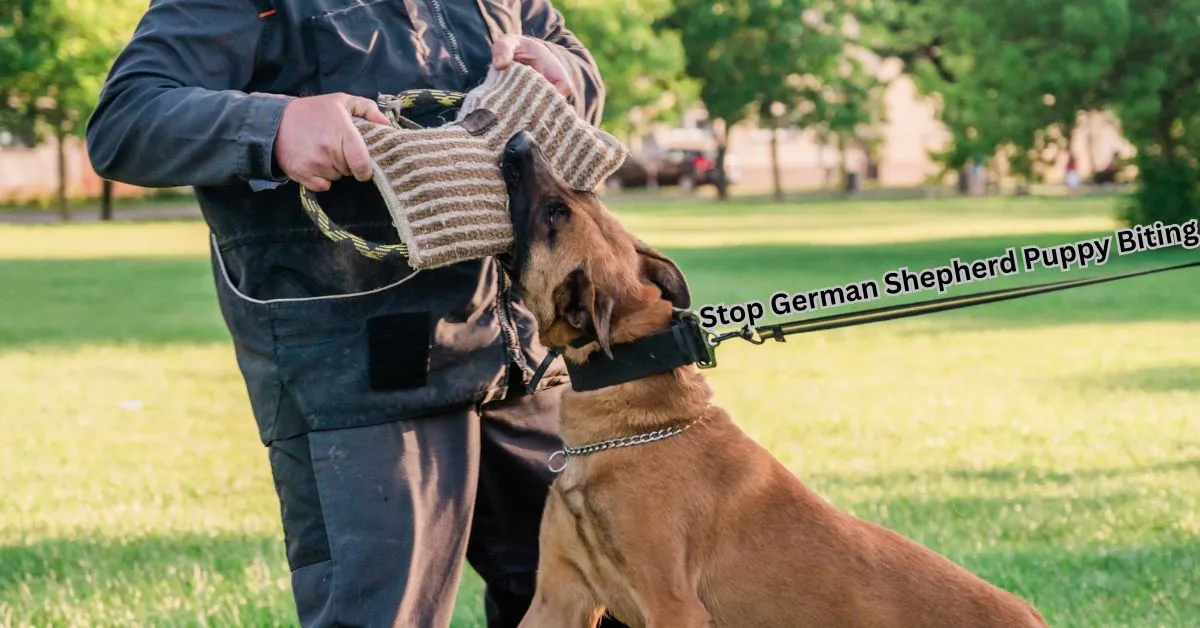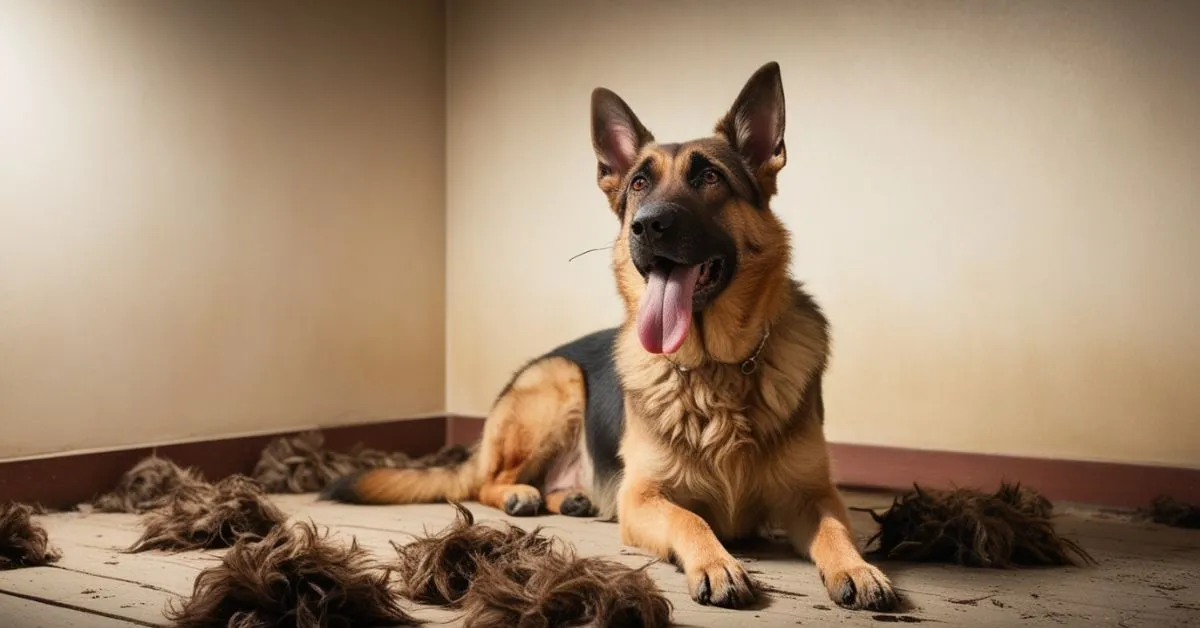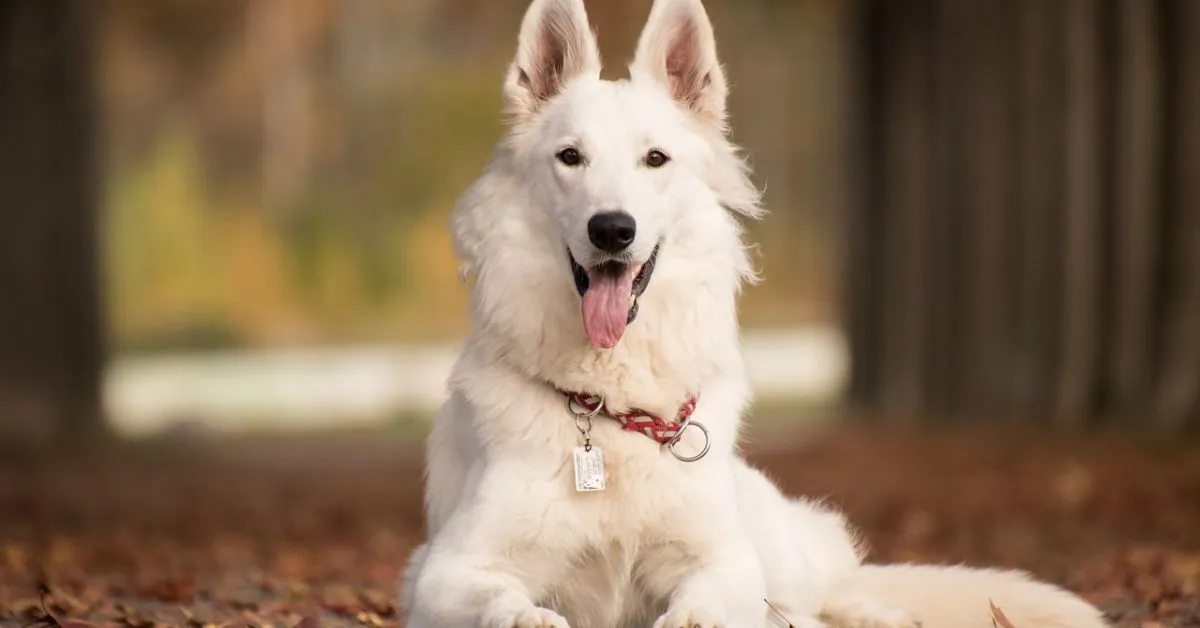Stop German Shepherd puppy biting is one of the first challenges many new owners face. Puppies naturally explore their surroundings through their mouths, especially during teething. However, teaching them early on what’s appropriate to bite is essential.
With the right approach, patience, and positive reinforcement, unwanted biting behavior can be managed effectively, helping the puppy grow into a well-behaved adult. This guide covers simple steps to help address and correct a German Shepherd puppy’s biting habits.
Key Takeaways
- Use Simulated Feedback: Mimic the natural feedback puppies receive from their siblings by letting out a high-pitched yell if the puppy bites too hard, effectively communicating this.
- Avoid Sudden Movements: When bitten, gently pull your hand away instead of jerking it, as sudden movements might excite the puppy and encourage more biting.
- Provide chew toys: guide the puppy’s biting behavior by providing chew toys to differentiate between what is appropriate to bite and what is not.
- Positive Reinforcement: Regularly praise and reward your puppy for gentle and appropriate play to reinforce positive behaviors and discourage biting.
Puppy Biting Women and Children: A Concern
When training a German Shepherd puppy, it’s crucial to recognize that the skin of women and small children is often softer and more sensitive than that of adult males. This can make it difficult for them when a puppy is in the teething phase.
Especially for children under the age of 6, the introduction to a puppy’s playful biting can be intimidating if the puppy is not trained to react properly. It’s essential to ensure that the training methods account for these differences in skin sensitivity.
To help the puppy understand and practice appropriate behavior, supervise interactions with women and children closely. Teach children to stand still and avoid waving their arms if the puppy begins to bite, allowing the puppy to learn that their hands are not toys.
Reinforce these lessons with positive reinforcement, praise, and rewards when the puppy stops biting and engages in gentle play. Consistent training, patience, and understanding of the puppy’s developmental stages will aid in successfully managing biting behavior even with small children involved.
How to Stop a Puppy From Aggressive Play Biting
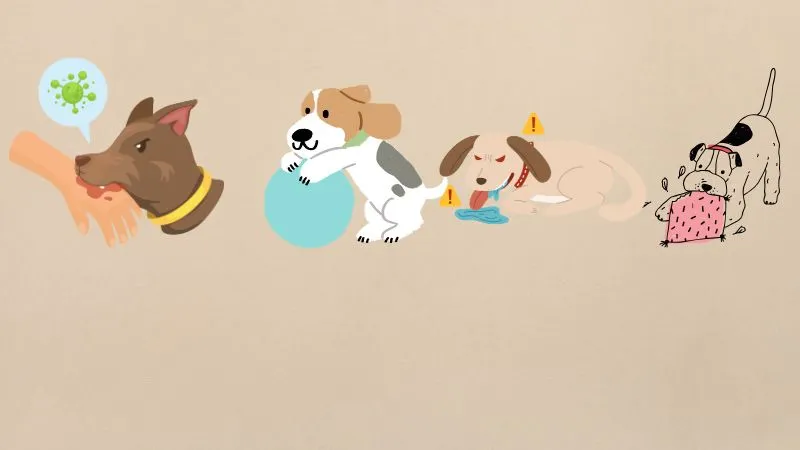
Understanding Puppy Biting Behaviors
Puppy biting can stem from various underlying motives, often linked to playful exploration or teething discomfort. Recognizing these behaviors early on and addressing them with the right techniques is vital to prevent them from becoming problematic. Here are some expert tips to manage biting effectively and prevent it from getting out of hand:
Avoid Punishment
Using punishment or physical corrections like grabbing the muzzle, tapping the nose, shaking the scruff, or pushing the puppy away can lead to defensive biting and may have negative repercussions. Instead of yelling or using the collar or crate as punishment, focus on understanding and modifying the puppy’s behavior positively.
Teach Hands Aren’t for Biting
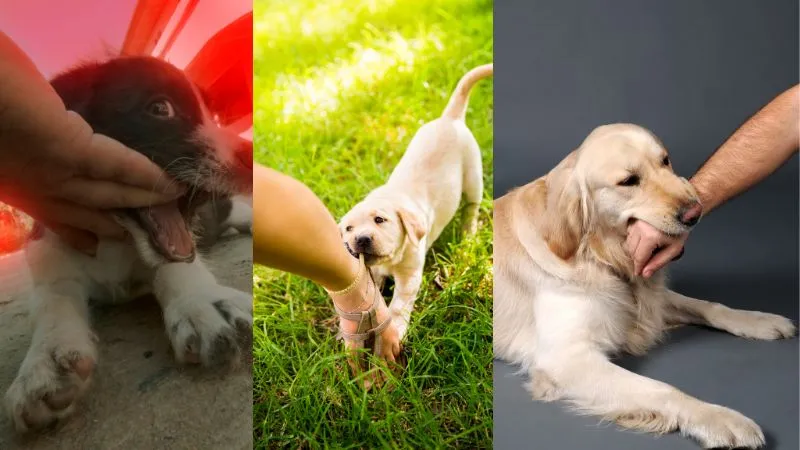
To ensure puppies learn not to bite hands during play, incorporate games and toys that teach gentle interactions. Hand targeting and promoting games like tug-of-war and fetch with biting toys help redirect their energy toward appropriate outlets.
Remove Temptations
Preventing the rehearsal of nipping behaviors is crucial. Keep tempting items such as shirts, shoes, and shoelaces off the floor. For ‘ankle-biters,’ wearing tall rubber boots can help protect ankles and legs until the puppy loses interest in these behaviors.
Redirect to Something Enticing
Use attractive toys to succeed in redirecting attention away from unwanted biting. Static items like a tossed ball, flirt poles, or edible chews like bully sticks or peanut-butter-stuffed Kongs can be excellent diversions.
Become Boring
Sometimes, becoming less interesting can deter biting. Puppies often bite as a reaction to movement, so freezing when they latch on can encourage them to lose interest. Protective clothing like long sleeves and rubber boots can also minimize potential injuries.
Provide Teething Relief
Offering teething relief is important for puppies with irritated gums. Items like frozen carrots, strawberries, bananas, frozen Kongs, or ice cubes can soothe them. Rotating different textures of toys can renew their interest and prevent damage to their teeth.
Provide Enrichment and Training
Enrichment and structured training exercises can engage a puppy’s brain and body. Use brain games, puppy-safe chews, and food dispensers to keep them entertained. Balancing high-stimulation activities like fetch with low-stimulation ones such as sniffing or treasure hunts can prevent overstimulation.
Provide Downtime
Puppies may bite roughly when overstimulated. Ensuring they have downtime in environments like a crate or playpen can help manage emotions and prevent overstimulation, much like toddlers who might lash out when overwhelmed.
Naps Are Good
Incorporating regular naps of up to 16 to 20 hours a day into a puppy’s routine ensures they receive balanced exercise, mental stimulation, and restorative sleep, which counteracts crankiness and reduces nipping.
1-year-old German shepherd biting
When dealing with a 1-year-old German Shepherd who continues biting, it’s important to determine whether the behavior is a form of play, an attention-seeking tactic, or a response to anxiety or stress. At this age, while the playful and curious nature of puppyhood often lingers, unintentional bad habits may have formed if not properly addressed.
To curtail biting, consistency in training is crucial, focusing on reinforcing positive behavior and discouraging negative ones gently but firmly. Socializing with other dogs can also teach bite inhibition through peer interaction.
Moreover, ensuring that the dog receives adequate exercise and mental stimulation through structured activities can help redirect excess energy, which often prompts biting. Professional guidance from a dog trainer can also be beneficial if the behavior persists, providing tailored strategies to rectify this habit effectively.
German Shepherd puppy biting phase
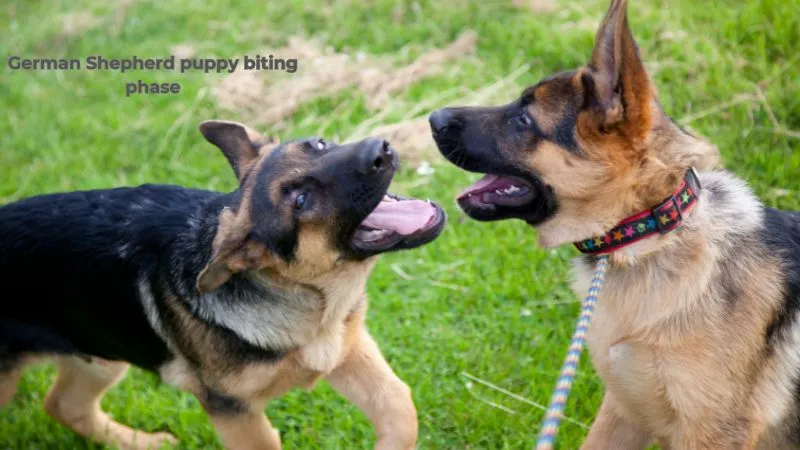
Navigating the biting phase of a German Shepherd puppy requires a comprehensive approach focused on fostering positive behaviors while curbing undesirable ones. German Shepherd puppies are naturally inclined to explore their world through their mouths, and during their teething phase, this behavior can intensify.
To manage this phase effectively, consistent training methods should be employed, emphasizing redirection and alternative engagements. Introducing a variety of chew toys that cater to a puppy’s instinct to bite can satisfy their need to gnaw while preserving household items.
Additionally, maintaining a routine that includes balanced stimulation through play and training, as well as scheduled rest periods, can prevent overstimulation and the resulting aggressive nibbling. A calm and patient demeanor during training sessions will help mitigate frustrations and reinforce desired behaviors, paving the way for a well-adjusted adult dog.
2-year-old German shepherd biting
Managing biting behavior in a 2-year-old German Shepherd necessitates a tailored approach as it might signify more complex issues such as anxiety, stress, or dominance challenges. At this stage, it’s essential to determine the root cause of the biting, whether it’s due to unaddressed training gaps during puppyhood or changes in the environment that trigger stress.
Incorporating advanced obedience training and reinforcing boundary-setting techniques can help mitigate these behaviors by establishing clear rules and expectations. Utilizing positive reinforcement methods, such as rewarding calm behavior and redirecting unwanted actions, can encourage the dog to exhibit desirable behaviors.
Moreover, activities like agility training or scent work can provide both mental and physical outlets for a German Shepherd’s abundant energy. Consulting with a professional dog trainer may be beneficial if the biting persists, ensuring tailored strategies are implemented to curb the behavior effectively and promote a harmonious coexistence.
What Causes My Puppy to Bite Me Aggressively?
Playing Aggressively
Understanding aggressive play behavior in puppies is essential for fostering positive interactions between them and their owners. Puppies often engage in activities like wrestling, mock fighting, and growling, which are normal parts of their playful nature. They might also nip, chase legs, or grab-at-pants behaviors that stem from their teething phase and their inherent curiosity.
While these actions are typical and healthy expressions of puppy behavior, they can sometimes come off as over the top. Owners must redirect this energy towards suitable outlets, like tug toys or interactive games, which can moderate the intensity of their play and encourage appropriate engagement with their human companions.
Teething
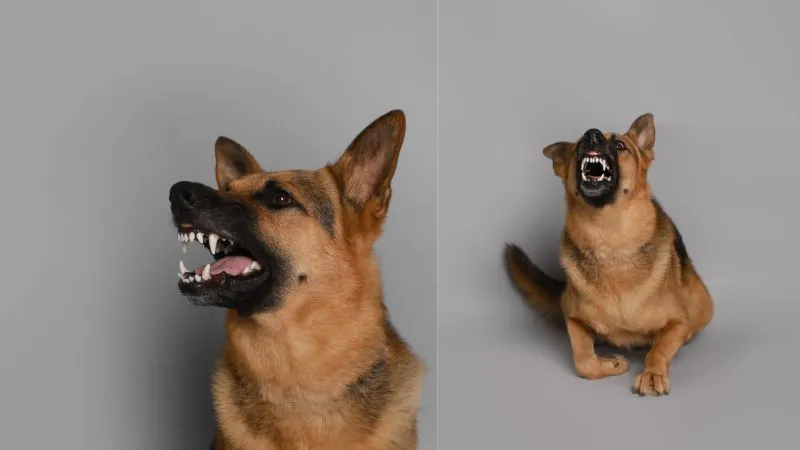
Teething is a significant phase in a puppy’s development, where discomfort from emerging adult teeth can lead to increased chewing and biting behaviors. As puppies transition from baby teeth to permanent ones, they experience sore gums and discomfort, which can be alleviated with appropriate chew toys.
This teething process prompts puppies to chew on objects, including hands and furniture, to relieve pain. Providing a variety of safe chewing options helps manage this phase effectively, fostering a positive chewing behavior that aids their developmental needs.
It’s Genetic
Certain dog breeds, including German Shepherds, have a genetic predisposition for biting due to their herding background. Bred for tasks like herding livestock, these breeds naturally exhibit increased bite intensity.
While this behavior is instinctive, proper training and redirection are essential to manage and channel such traits into acceptable actions. Understanding the genetic components behind a breed’s tendency to bite enables owners to tailor training methods that address these instincts constructively.
Overstimulated Puppies
Puppies can become easily overstimulated, leading to increased biting behaviors. Much like toddlers, puppies may react to excessive stimulation with cranky or aggressive actions, such as persistent biting.
It’s crucial to identify signs of overstimulation and provide calming opportunities for the puppy to self-soothe and settle down. This involves managing their environment and balancing active play with quiet downtime to prevent overtiredness that could exacerbate biting behaviors.
Defensive Biting
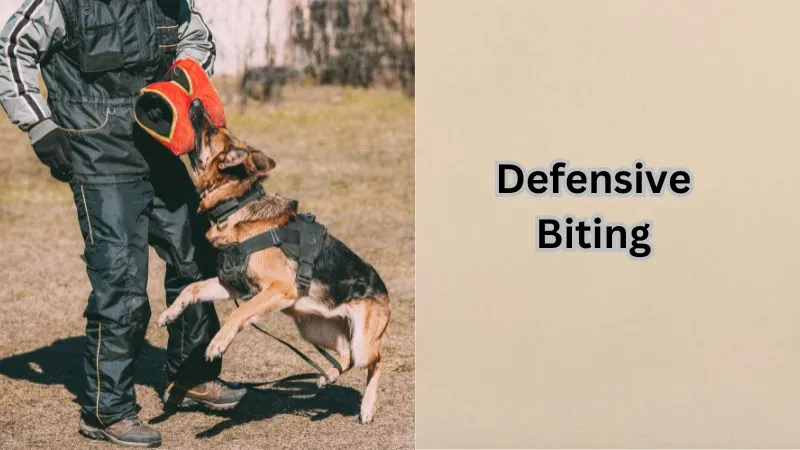
Defensive biting in puppies, although rare, can stem from situations where they feel the need to protect resources or themselves. Warning signs include stiffening, growling, or biting when guarding food, toys, or sleeping areas.
Understanding the triggers and contexts, such as encounters with unfamiliar people or children, is vital. Positive reinforcement of calm behavior around their resources can help mitigate defensive reactions and establish trust during handling and restraint exercises.
Not Wanting to Be Touched
Some puppies may exhibit nipping behaviors when they are uncomfortable with being touched, picked up, or handled. This reaction can be related to resource guarding or an aversion to restraint.
To prevent these behaviors, it is important to gradually introduce handling exercises that get the puppy used to being touched and picked up. This gradual exposure helps them build tolerance and prevents biting during typical interactions with their human companions.
The Importance of This Method
Using non-violent methods to correct biting behavior is crucial, as smacking or hitting can instill fear and lead to more severe issues like fear-based aggression.
Puppies need to associate biting with negative outcomes without fear, ensuring their comprehension of right and wrong through consistent and POSITIVE reinforcement techniques.
Preventing fear responses promotes healthy behavior patterns and a trusting relationship between the puppy and its owner.
Your Veterinarian or Trainer is Mistaken.
Even experts may sometimes endorse ineffective or outdated training methods for managing biting in puppies. It’s important to engage with certified dog trainers who understand the developmental stages of puppies and who practice current, effective methods.
Constructive disagreement with a vet or trainer who advocates for improper techniques can lead to seeking better alternatives that align with modern, compassionate training philosophies.
Hitting Your Puppy or Shutting Its Mouth Tightly.
Physically punishing a puppy by smacking or clenching their mouth shut to correct biting behavior is detrimental and can lead to more severe behavioral problems. Such actions are likely to reinforce fear and aggression, damaging the bond between the pet and the owner. Instead, focus on positive behavior modification techniques that emphasize praise and rewards for desirable actions, creating a foundation for a well-adjusted and well-behaved adult to do.
Conclusion
To wrap it up, getting a German Shepherd puppy to stop biting takes time and practice. It’s important to be consistent and calm, showing your pup what’s okay to chew on and what’s not. Redirect their biting to toys and give them praise when they do it right.
Set clear rules from the start, and be patient; puppies learn through repetition. With the right approach, your German Shepherd will grow out of the biting phase and become a loving, well-behaved part of the family.
FAQs
How to train German Shepherd puppies to not bite?
To train your German Shepherd puppy not to bite, start with socialization and exposure to different people and environments. Use positive reinforcement when they exhibit gentle behavior and redirect bites to toys or chews. Consistent training with rewards for non-biting behaviors helps establish long-term discipline.
How do I get my puppy to stop biting asap?
Immediately address puppy biting by yelping softly to mimic their littermates and withdraw attention if biting continues. Offer chew toys to redirect their biting behavior, ensuring they understand what’s acceptable. Maintain a consistent training routine to reinforce the right habits effectively.
What command stops a puppy from biting?
Utilize the “leave it” command to stop a puppy from biting, which involves offering a treat in one hand while saying the command. As the puppy understands to halt the bite in exchange for a reward, reinforce this command consistently. Practice regularly to cultivate an obedient response.

